The main reason for this trip was to see how Aleppo soap is produced. But Aleppo and its hinterland have more to offer than groves and soap factories. Hence this diary.
Eight days in Aleppo.
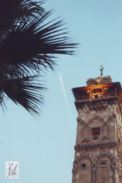
» Omayade Mosque
Wednesday, October 24, 2007
Approaching Aleppo
Throughout the border region around Antakya, mountains seem to float on the alluvial soil, like smaller and larger islands. Sometimes this morning, I can´t help but think that this road must be a bridge, leading across the sea, or across something like a land reclamation, across the sea behind levees, that keep it separated from the wide open, to turn it into land during the years to come. In the haze of the morning, and against the backlight, the real mountains only show their adumbrations. The more massive they are, the more unreal they appear to be. Off the road, there seems to be the world on the second or third day of the Genesis, or the world on its final day ever.Later, the scenery comes back to life, as it becomes tangible through details again. Villages, groves, and mosques (the latter no more than rural chapels, but more numerous), and every now and then, graveyards at the roadside.
But the thin clouds underneath the sun are still looking like hyper-lucent radiograms of a human body – ribs and bowels, all grey in grey.
The border crossing bears some resemblance with that of former East Germany. It is by no means as massive, and I suppose there is no death strip, but the fences and watch towers look quite the same. Passport check and customs clearance take some 90 Minutes, and especially some Syrians are kept stalled by their country´s officials for a long time.
The van that takes us to Aleppo is probably the holiest one I have ever seen. Pious islamic suras spread across the tarpaulin, and right above me, there is a poster of Mecca.
All windows are open.
We are reaching Aleppo. For a moment, I can see the city, clearly distinguishable from its hinterland which we are still passing through. I see Aleppo with a blink of an eye, through the airflow.
Then we are in town, and it has still commenced inconspicuously. A big mosque, the biggest one since we left Turkey, comes into my vision, and to remove any possible doubt, the Aleppo Chamber of Commerce. We have reached our destination. Roughly, anyway.
We are getting off the van by guess and by gosh. It happens to be the right place.
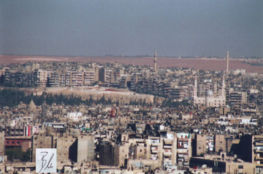
» Aleppo, North of the Old Town
Thursday, October 25, 2007
In the morning
3.2 million people live in Aleppo, some residents say, and 800,000 more in the hinterland. Other sources state less than two million inhabitants in the city. So far, I can hardly tell our neighbourhoods apart. I´m rehearsing the first walks: through quarters arranged by different industries, like tyre shops and workshops, ironmongers, and farm machine outlets. Even those who live in the rural areas (a number that seems to decline continuously, as ever since the 1980s, there is said to have been migration into the city) have reasons to come here every now and then. By truck (big or small), passenger car, by bus, or by horsecart. Even on foot.Once you are here, you might seek some entertainment. But then again, maybe not. A Bedouin meets my neighbourhood´s cinema, shortly after sunrise, the street lamps are still on, the rolling shutters of the shops are still down, and everyone but me seems to wear a chequered headscarf. The Bedouin isn´t aware of me. He is looking up to the images on the front wall: Jackie Chan, knife-brandishing outlaws and gentlemen, and a young woman who appears to do press-ups (in her undies). He´s all alone with these pictures, staring up to them, and he´s stunned. He looks like he has never seen this reprobate pantheon before. Maybe he isn´t here for the first time, but he looks like it. I´m going past him, unnoticed.
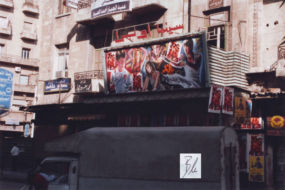
» Cinema
Military Courts
Syria military, South of Blueland
taide.wordpress.com,
March 30, 2008
Majorities and Minorities
You can say this here: Genocide. In Aleppo´s Armenian orthodox Church they installed a memorial stone in the 1980s, its inscription stating the mass murder and starvation of Armenian people in this region, at the hands of Turkish nationalists. In Turkey, this commemoration would be illegal.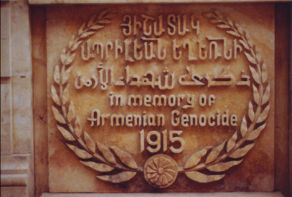
» memory
Up to 20% of Aleppo´s residents are said to be Christians, and 70% of them Sunnis. To all appearances though, Christians are less than 20%. You don´t see too many women who wouldn´t wear a headscarf at least, if not burquas that cover even their faces. How can someone hiding in a complete bag be someone else´s interlocutor? It is strange to imagine how they shop, haggle about prices or (maybe) get into a cab.
Once in a while, there are women without any headpiece, dressed in a Western style, and mostly with striking and assertive faces. Determination will be the least they need to prevail in daily life.
Honour crime fear of Syria women, BBC News, Damaskus, 12.10.2007
For a foreigner, especially without previous knowledge about the culture he meets, it is tempting to jump to conclusions. The assumption that this republic or disguised sheikdom was only so diverse as it is run by a more or less secular dictatorship could be such a hasty conclusion. Same with the idea that besides Islam, clanship would count most. This occurs to me when looking at presidential posters on shop doors, with the background of a fingerprint in the colors of Syria´s national flag. Maybe a sociologist, familiar with Syria, would actually say so, and even offer some evidence. But I don´t know much about it.
Saturday, October 27, 2007
The Old City
Some 1250 years ago, and again about one thousand years ago, the Arabs conquered Aleppo from the Byzantine Empire. They are said to have come through the Gate of Antakya, West of the Old City, some hundred metres from where you find the Clock Tower and the newly-built Sheraton Hotel these days. Ahmed draws our attention to a Roman triumphal arch, which was walled up by the Arabs, and integrated into the building of a mosque, "but was not destroyed".Ahmed takes a breath and waits for our demonstrations of admiration.
But this islamic sense of culture doesn´t command much awe. I remember the naval custom of putting your flag on a captured ship of your enemy, above the original flag of your enemy – especially if it is a particularly mighty warship.
Aleppo opened the gate to the Muslims voluntarily, explains Ahmed.
Sure, says a colleague. Once you have lost a war anyway, you try to save your city from destruction.
Not at all, says Ahmed. The residents were very happy to see the Arabs taking over. Before, Aleppo had been ruled by sectarians or "mad people". By "towerists" (people spending all their lives in towers), or even crazier "columnists" who could live with even less space, plus the completely moronic Maronites.
Mhm... maybe. But Ahmed starts realising that we are completely impenitent westerners, and leaves it there. He was born in the Old City. He is an able and learned man, but I´m sure that his wife wears a burqua.
Yet an academic he is, and research and scholarship wouldn´t do fine without some instances that are neutral towards religion. Maybe this is why Ahmed mentions the advantages of iron-fist government, like the one of Syria. He certainly isn´t in love with it, but he respects it. Possibly because he has no choice anyway, or simply because he knows the problems of fundamentalism from his own experience.
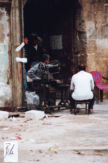
» Gate of Antakya, Aleppo
The souqs run from West to East, with ramifications to the left and to the right. Depending on when the halls were built, their arches are built more or less lavishly. The caravanserai are courtyard houses at the souq, and people from Aleppo´s hinterland still get their products there. The courts are full of lorries, most of them small ones. China is represented, too, both among the merchandise, and the lorries. Changhe is no rare vehicle here.
Winners and Losers
Maybe the Syrian Arab Republic knew more egalitarian policies in the past, similar to other countries that were aligned with the Soviet Union, or China. They say that Hafez al-Assad, Syria´s late president and father of the incumbent, had been a left-winger in sociopolitical terms. By now, Syria has started modernisation efforts, and the leftist policy (if it ever existed) has gone to the dogs.To learn about these matters in conversations is not easy. That´s not only because Syria is a police state. In this country, too, different people feature different pictures of past and present realities, and these pictures have to fit into their respective provenances, religious views, and their future opportunities. Sometimes, they talk about it. It is Brian´s flip-flop to one person, and his holy oil lamp to the other.
A Syrian´s appearance may already give you a clue about the world he´s living in. There are those accurate guys, thirty- or fourty-plus, wearing a business suit with or without a tie, featuring a moustache, asking reasonable questions and providing reasonable information, too focused on their daily work to waste time on culture clashes. In some field, all of them are professionals. Usually neither visibly rich, nor poor.
Some of the poor are street sweepers or day labourers. And there are the shoe shiners. That strikes me even more when grown-ups offer that service, than when children do. Neither the educational level, nor demand for it from the industries, seem to be high in Aleppo.
This may be true for all of Syria. But in Aleppo, hearsay suggests that it is aggravated by social backgrounds that don´t exist in such an accentuated way elsewhere in the country.
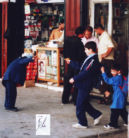
» water pistol
On the one hand, this grey city is said to be one of the most diverse in terms of religions. On the other, it is also said to be the most reactionary one. There was no insurgence like the one by the Muslim Brotherhood that could compare with the one in Hama, and the Syrian government didn´t react by devastating Aleppo, while it did destroy much of Hama. But ever since 1982, both cities seem to be to be left out when it is about big national projects. Syria´s government, seen by the US administration as part of an "axis of evil", allows itself a province of evil within that needs to be combatted in one way or another.
This kind of blockade may actually suit bimpish imams here. But what results from this situation is certainly not always what they would like it to be.
An interesting theory on Aleppo
halab.wordpress.com,
March 22, 2008
These messages are not religious. But they might blend quite well with those religious messages that disrespect women, too. After all, this music sees women as objects, be it in Western, or be it in oriental countries.
If shop owners employed women, rather than men as part-time salespeople, maybe they would sell something. Here is a shop assistant who preferred to discuss... erm... sports... erm... politics? history?
Salesman:
You are German? I´ve been to Germany."
German:
Oh, where?
Salesman:
In Dresden. A lot of it was destroyed in world war 2. Now they are destroying us. I will take a Kalashnikov and fight.
German:
If you think it helps... But I don´t think it will be useful.
Salesman (unlocks an imaginary Kalashnikov):
I´m practicing.
German:
Have a nice day.
A free ride for an American "enemy"
halab.wordpress.com,
December 2, 2007
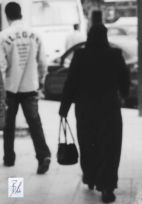
» Ilegal
alrooj.wordpress.com,
July 8, 2008
Radio Arabesque was founded in 2006. Whoever wants, may see that as a step towards more societal openness. But I guess that is a matter of interpretation. One might see it this way, especially if you hope it will happen. Syria, like any country, certainly serves as a projection screen for many foreigners and nationals. Less than one hundred years ago, it symbolised defeat to the Ottomans, and victory for the World War 1 entente. For Ahmed, the Gate of Antakya mirrors the beginnings of a more or less just Islamic reign. For one or another Westerner, it may be an evil empire (possibly something smaller than an empire, though). But for sure, any country you might pick is there for better reasons, than to serve as your personal silver screen.
Monday, October 29, 2007
Fever
Wind and draft is hard for me to handle. Aleppo is a windy city. Any house that is built in a classical way has the advantage of encouraging a breeze in summer. Any car has the dubious advantage that you can wrench the panes into the door. After a long ride across the hinterland, I have caught a cold.A poster at a bookstall shows Turkish soldiers on the move, easily recognisable by their G3 guns. The Turks have kept their houses flag-decorated for weeks now, showing their patriotism against the PKK.
I´m taking a break at noon. To kill time, I take my temperature whenever I wake up. 38.36 degrees C. at 2 p.m.
It was more than 39 last night, I guess. I talked or sang while half asleep, or woke up from it. I dreamed of two countries that quarrelled with each other. "Don´t fill this map with crescents", someone said. "That´s way too religious. No need to hype this matter. It isn´t about crescents. It´s about bananas."
They filled the second country with round cookies, instead of the full moons it desired. But not everyone was satisfied. The brawl went on and on.
38.37 degrees at half past two, 38.3 degrees at three, and 37.77 degrees at a quarter to four.
Seems I can leave it behind now.
Northern Syria is waiting for the rains. They should have come early this month. Sometimes, the sky is almost overcast, but never without some gaps in it.
To see Aleppo, you have to mind the details (well, some of them, anyway). Above you, in the arches where you won´t look, but on the walls as well, there are hints to old customs and stories. One of the caravanserais features two wooden hands of a dervish. Opposite of those arriving in the courtyard, there is a hand facing upwards, and behind them, above the entrance, it points downwards. When dancing and gesturing like this, a dervish expresses God´s protection, they say. Between these wooden hands there was the courtyard with the merchandise, resting safely. And up there in the rooms, the traders could sleep peacefully at night.
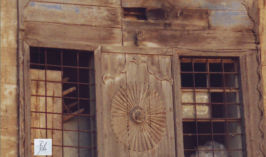
» wooden hand of a dervish
Some decades ago there were still many dervishes in Aleppo. Their problem was that they were too focused, says Ahmed. They spoke their mind, but other people couldn´t follow their thoughts.
"Where is God?", traders asked an old dervish on the road.
"God is underneath your feet", replied the dervish.
The traders killed him for heresy.
Later, possibly years later, they asked a travelling dervish why his old colleague had said such blasphemous things.
"Dig where you stood when he spoke to you", replied the travelling dervish.
The traders found money and precious metals underneath the dusty road.
"He saw what you couldn´t see", said the travelling dervish. "He saw the treasures under the road you walked upon. And he saw that money was your God."
Tuesday, October 30, 2007
Outlandish Encounter
Last night, West of the old city, some (probably Russian or East European) prostitutes hastily crossed our path, most strikingly a real or would-be teenie in a light-blue skirt that hardly covered her butt. They all rushed from a house entrance to a rusty Volkswagen van with clattering heels, and the sliding door rolled and snapped in.Was my fever back? Was I hallucinating?
"Shit, I forgot to ask for an autograph!"
"Shit, I forgot to take a photo!"
Others were better prepared than us. A strikingly big group of young Syrians had been waiting for the show which appears to show everyday at the same time.
Rain is setting in late in the afternoon. The loudspeaker calls to prayer from the minarets are failing, obviously the rain has caused numerous short-circuits on the communications systems. Only from a distance of two or three kilometres we can hear a muezzin. This must be his finest hour. The whole city can probably hear him.
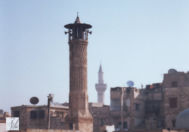
» Hello World
A Soap Producer
The old man manages to look surly and content at the same time, and still less surly than on official photos, where he wears a business suit and a tie. Here, at home in his office room, he wears practical knock about clothes, and he has moved his trouser waistband up to his ribs, leaning back comfortably after a stressful morning. It´s all done. His ambitious working programme, and most of his successful life.Baron Hotel
Half past four, teatime in a special place. A big flight of stairs leads to the entrance of the Baron Hotel. The bar is to the left. We opt for the right, and walk into the tea and television room. Ornamental, and still western bathing-room compatible tiles cover the floor, and we sink deep into orange couches around a low table. The curtains are orange, too. The blinds in front of the windows are closed, muffling the noise of the city and the rain outside. Metal-framed pictures on the walls under a high ceiling contain engravings, probably with motives from Aleppo. And in a display cabinet on the wall, they feature Lawrence of Arabia´s Home Letters and, apparently, his lemonade bill.After a completely ignored game of soccer, the TV programme switches to a Syrian soapie at five. Exactly on time, a hotel manager joins us.
Emotional releases, morals, beautiful dead bodies, and lots of bedrooms on the screen. The hotel manager falls asleep in his armchair.
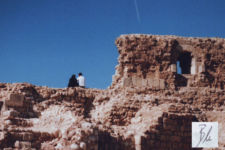
» Aleppo, a human touch on the Citadel